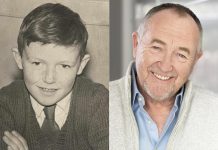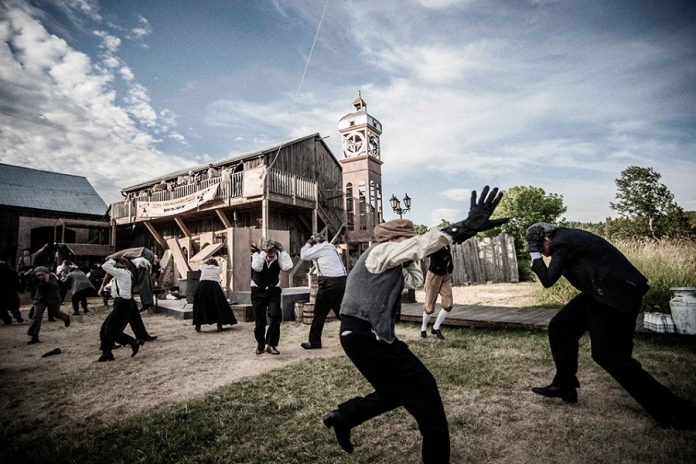
After months of preparation and media buzz, 4th Line Theatre’s much anticipated production of The Hero of Hunter Street opened last week at Winslow Farm in Millbrook. A brand new production written by Dora-winning playwright Maja Ardal and directed by Kim Blackwell, The Hero of Hunter Street continues 4th Line’s commitment to bring the history of The Kawarthas to life.
The Hero of Hunter Street is a hybrid of fact and fiction about the family of Dennis and Laura O’Brien, and how their lives were changed forever by one of the most severe tragedies in Peterborough’s history — the night on December 11th, 1916 when the Quaker Oats factory exploded and burned to the ground.
The play is a delicately written tapestry that weaves a lot within its script. At the core of the production is the Quaker Oats tragedy, but the true heart of the drama is the narrative of the O’Brien family, which came from real-life stories passed down to long-time 4th Line Theatre volunteer Lorna Green by her grandfather George O’Brien, the son of the Dennis and Laura O’Brien.
However, playwright Maja goes much further than a family drama by painting a complete portrait of Peterborough’s social and political landscape in 1916, including issues at City Hall, the subtle rivalry between Irish and Italian workers, and the continuing reality of World War I. The Hero of Hunter Street is very much an historical overview, but presented in an entertaining performance. Pathos and comedy are combined with music, movement, drama, and storytelling in an emotionally engaging production.
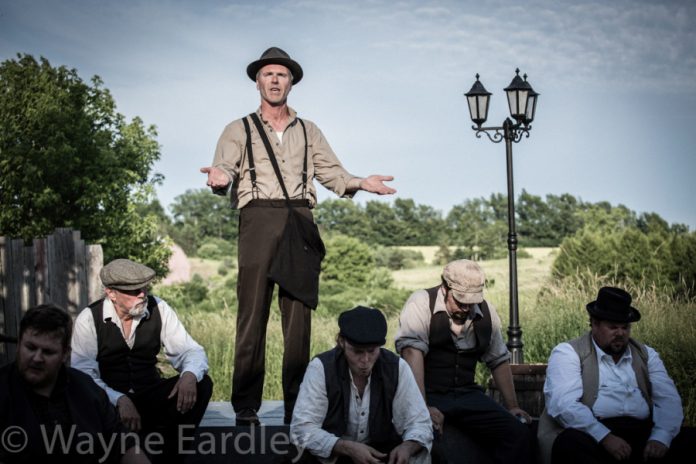
The play opens with the people of Peterborough preparing for Christmas in 1916. The men are working overtime at Quaker Oats to have something extra under the tree, while the women are sewing bags to package the oats. The factory is working in overdrive to send food overseas for soldiers fighting in the war.
Dennis O’Brien (Mac Fyfe), along with his father-in-law William Hogan (Geoff Hewitson), has been working even longer hours at the factory with plans to purchase a house that will better accommodate Dennis’s family of five. But when he reveals his plans to his wife Laura (Monica Dottor), he doesn’t get the reaction that he expected. Unknown to him, Laura has news of her own and, although the couple loves each other very much, the pair goes to bed with many words unspoken.
Meanwhile, the couple’s young son George (Liam Davidson) has a habit of exploring the streets of Peterborough, much to his mother’s chagrin, where he meets a vaudevillian strong man named Ajax (Mac Fyfe in a dual role) who claims he can lift three 250-pound men over his head.
Obsessed with Ajax’s claims, George begins to plot on how to get enough money to go to the show.
That night, as the O’Brien family sleeps, the oldest O’Brien son Joe (Justin Laurie) sneaks out to enlist in the war, not knowing that the next day life for the O’Brien family — as well as hundreds of families across Peterborough — will change forever.
At 10 a.m., an explosion in the boiler room will decimate the Quaker Oats factory. Hundreds of men will be injured and out of work and 26 men will not be coming home. The Hero of Hunter Street explores the grief, as well as the strength, of the O’Brien family as they struggle to survive in the wake of the tragedy.
It takes a lot of people to recreate an entire community, and director Kim Blackwell uses her huge cast well. Bringing together performers of varying ages, Kim successfully creates the illusion of an entire city of people with the majority of the actors playing multiple roles. Through the excellent efforts of the cast, Peterborough in 1916 comes alive for the audience.
While he’s rarely part of the actual narrative, the busiest actor in the show is actor Ryan Hollyman who plays an unnamed character known only as “The Man.” Hollyman is always on stage and carries the crux of the show on his shoulders. He’s the audience’s guide and host for the play, setting up the scenes, introducing the characters, and providing narration when needed. Lively and engaging, Hollyman is part narrator and part historian, but draws the audience in without making it seem like he’s giving a university lecture.

It takes a lot of charisma to be able to pull off a role whose primary function is to give the audience lots of historical facts, but Hollyman succeeds, and as a result draws the audience into the show and places them solidly in 1916. Hollyman is a joy and in my opinion the true hero of the production.
Meanwhile, Mac Fyfe and Monica Dottor bring both tragedy and laughter to the show by playing two very different dual roles. In the main plot, they play the key characters of Dennis and Laura O’Brien, but in the subplot they play Ajax the strong man and his wife/assistant Gertie. With a quick costume change — and some over the top vocal changes — the pair go from turning on the tears to bringing out the laughter at a snap of the fingers.
It’s a testament to the talents of these two great actors, who help set up the show’s tension and then tear it down with comedic relief. The pair also has an unmistakable chemistry with one another, creating an intimate connection between both sets of characters. The result is that both the O’Briens and Ajax and Gertie become the stand-out characters of the show.
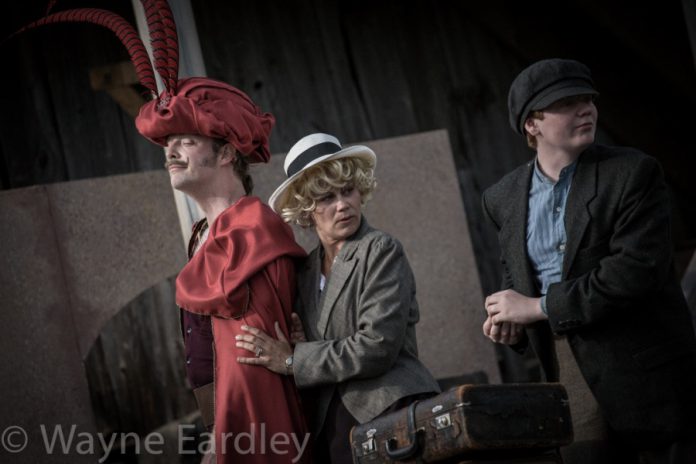
The O’Brien children — Irene (Frances Loiselle), Joe (Justin Laurie), George (Liam Davidson), Kay (Maude Rose Craig), and baby Michael (Eli Fisher/Kolton Menzies) — bring a lot to the table in their roles, with the stand-out being Liam Davidson as George, who takes much of the second act on his shoulders.
Another subplot revolves around the O’Brien’s Italian neighbors the Lorenos, whose matriarch Sophia (Hilary Wear) is not only raising six children alone while her husband’s lies in a sanitarium, but also works sewing oat bags and becomes the first to aid the wounded after the Quaker factory. Hilary gives a remarkable performance, also making her stand out amongst the huge cast.
Although not exactly a musical, The Hero of Hunter Street contains 17 original songs written by Maja Ardal and arranged by musical director Justin Hiscox. With Hiscox and his band (including Rob Fortin, Mark Hiscox, and Saskia Tomkins) remaining on the set throughout the entire production, the musical numbers fit nicely within the production, usually acting in place of soliloquies as a way for the characters to let the audience to know what they are thinking.
The most important of the musical numbers is “Something to Tell You”, sung in the first act by Laura and Dennis. It’s key to the family drama, allowing the audience to understand the situation within the home while the words go unspoken between characters. Just as “The Man” gives narration, the songs become another entertaining tool for communicating historical and emotional information.
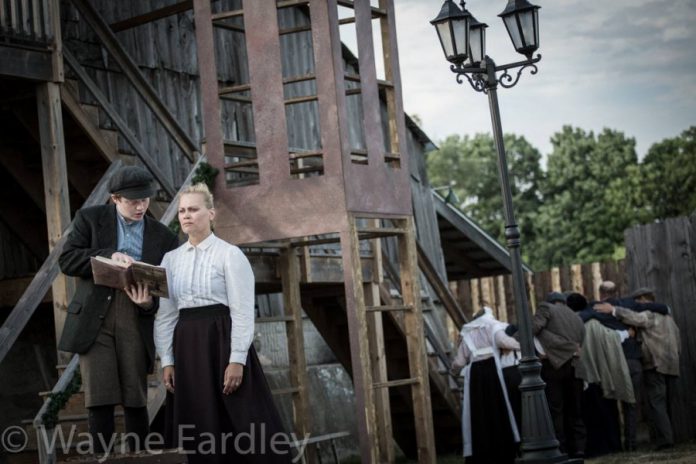
The use of choreography throughout the show is also important to the play’s success. Along with the music, there’s also a lot of stylized movement, especially in the final part of the first act as Quaker Oats burns. Obviously not actually able to burn down the Winslow Farm barn, the cast partakes in a ballet to create the illusion of flames, chaos, and death. It’s a powerful and haunting effect, creating a sense of horror where time seems to slow down as bodies burn.
The comedic moment of the night belongs to a clever dance performance by Monica and Mac in their roles of Ajax and Gertie in the second act, proving again that dance and movement are as important to the show as the music and drama.
I also want to give special praise to Maja for her wonderful twist ending to the show. Although I’m hesitant to say too much as not to give away the ending, Maja includes more recent legend and lore tied into the Quaker Oats factory, especially surrounding building eleven where the fire originated. As a fan of local Peterborough legends, I really appreciated the way Maja finishes the play.
Bringing history to life is something 4th Line Theatre is known for, but they go above and beyond with The Hero of Hunter Street. The show brings a lot to the table and it succeeds in so many ways. It is both a tragedy and a comedy, a social and political tapestry, and a family drama.
But most of all it brings the reality and the tragedy of the Quaker Oats fire back to life for today’s audience so we can understand and relate to what happened on that tragic day and how it affected an entire city. The Quaker Oats fire is an important part of Peterborough’s history.
Since nobody who was around for the tragedy is still alive today, before this play the men who died and the families affected could have been forgotten. The Hero of Hunter Street retells their stories and struggles to ensure we won’t forget. The play is another 4th Line Theatre triumph that will surely be remembered as one of their best and most important productions.
The Hero of Hunter Street runs until July 23rd at the Winslow Farm in Millbrook. Although most performances are sold out (or close to it), more tickets will be available next week.
All photos by Wayne Eardley, courtesy of Wayne Eardley Photography.











